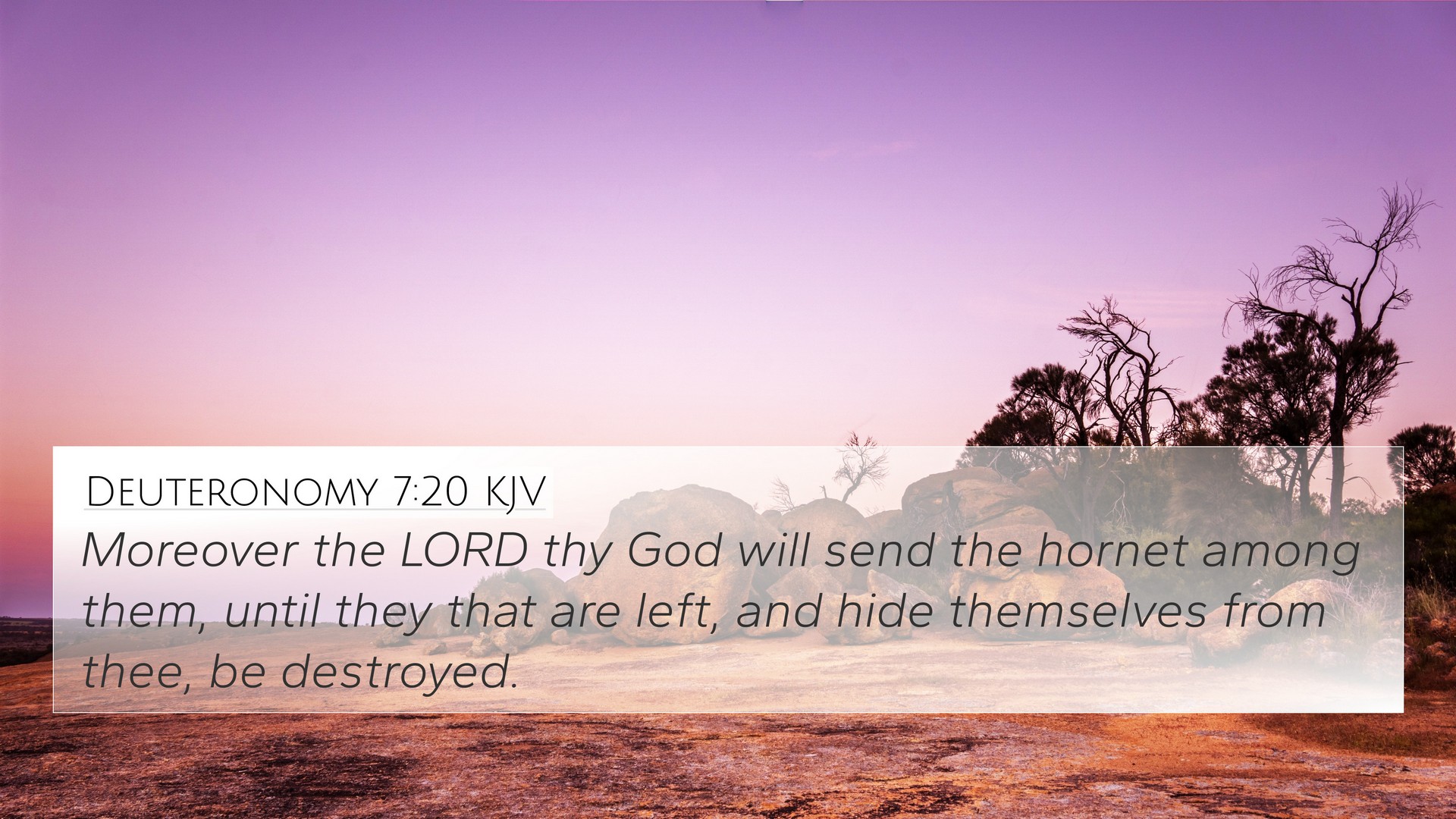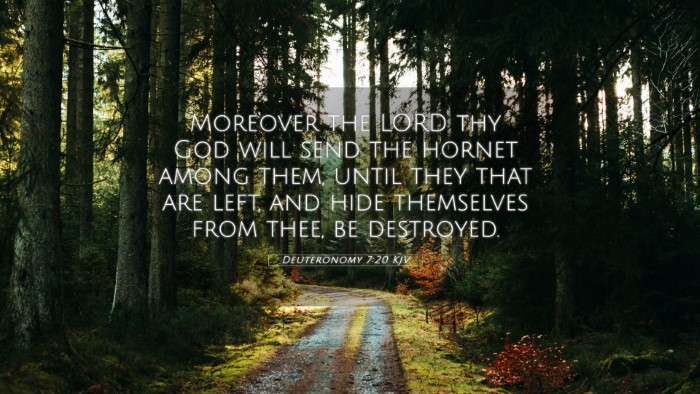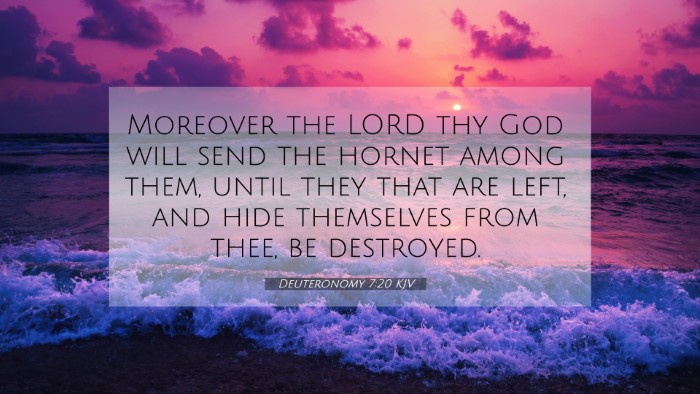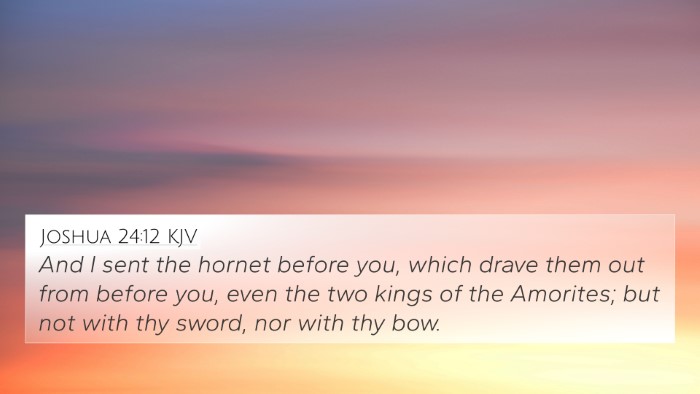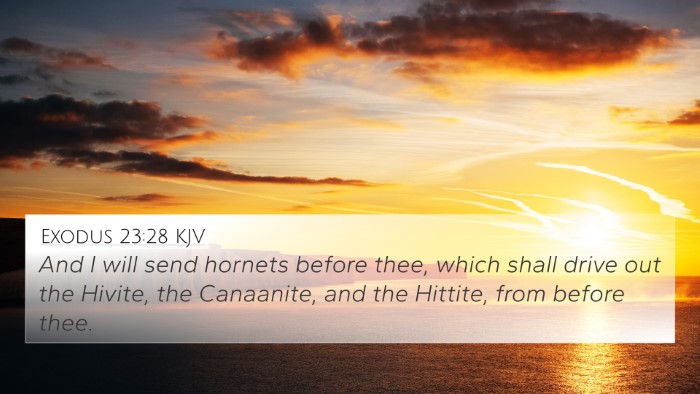Deuteronomy 7:20 - Summary and Interpretations
Bible Verse: "Moreover, the LORD your God will send the hornet among them until those who are left, who hide themselves from you, are destroyed."
Understanding Deuteronomy 7:20
This verse highlights God's assurance to Israel regarding the conquest of the Promised Land. It emphasizes divine intervention in driving out their enemies. The imagery of the "hornet" symbolizes fear and confusion inflicted upon their adversaries.
Insights from Public Domain Commentaries
-
Matthew Henry's Commentary
Henry describes the "hornet" as a metaphor for God's power to instill dread in the hearts of enemies, accelerating their destruction. It reflects God's commitment to His people by promising not just conquest, but a complete eradication of threats. The involvement of divine agents signifies the impossibility of escaping God's judgment.
-
Albert Barnes' Notes
Barnes notes that the "hornet" is a literal manifestation of God's intervention. He interprets this as God's method of ensuring Israel's victory. The use of natural elements to achieve divine ends shows how God orchestrates events to fulfill His promises to His people.
-
Adam Clarke's Commentary
Clarke expands on the idea of God's assurance, explaining that the hornet represents various means of judgment. He emphasizes the moral and spiritual dimensions; God was not just aiding in physical battles, but also seeking to establish His people in righteousness, ensuring their obedience to His covenant.
Thematic Connections
This verse can be connected to various biblical themes and cross-references that further illuminate its significance. Below are key verses that relate to Deuteronomy 7:20:
- Exodus 23:28 - "And I will send hornets before you, which shall drive out the Hivites, the Canaanites, and the Hittites from before you." This verse foreshadows the Divine assistance mentioned in Deuteronomy 7:20.
- Joshua 24:12 - "And I sent the hornet before you, which drove them out from before you, the two kings of the Amorites." This reflects God's ongoing support for Israel even after the initial conquest.
- Judges 2:1-3 - In these verses, God reminds Israel of the covenant and the consequences of their disobedience, linking it back to the importance of faithfulness in the context of Deuteronomy 7:20.
- Proverbs 21:31 - "The horse is made ready for the day of battle, but the victory belongs to the LORD." This verse speaks to the ultimate sovereignty and authority of God, ensuring victory on behalf of His people.
- Romans 8:31 - "What then shall we say to these things? If God is for us, who can be against us?" This New Testament parallel reiterates God's unwavering support and protection of His chosen ones.
- 1 John 4:4 - "Little children, you are from God and have overcome them, for he who is in you is greater than he who is in the world." A reminder of God's presence and power within believers.
- Hebrews 11:30 - "By faith the walls of Jericho fell down after they had been encircled for seven days." This verse reinforces the principle that faith activates God's power in battle.
Cross-Referencing and Comparative Analysis
Deuteronomy 7:20 serves as a bridge to connect various scriptural themes regarding God's promises and the assurance of His assistance. When analyzing this verse comparatively with others, we find several poignant themes:
- Divine Protection: Many scriptures emphasize God's role as a protector, exemplified in Psalms and the Gospels.
- Faith and Obedience: The necessity of faithfulness to God's commands underpins many teachings throughout the Scriptures.
- Judgment and Deliverance: The dual themes of divine judgment against enemies and deliverance of His people resonate throughout both Testaments.
Tools for Bible Cross-Referencing
To fully appreciate the connections between Bible verses like Deuteronomy 7:20, one can utilize various tools:
- Bible Concordance: A useful resource for finding themes and words throughout Scripture.
- Bible Cross-Reference Guides: Guides can help locate verses that support or contrast significant biblical ideas.
- Cross-Reference Study Techniques: Learning methods to efficiently cross-reference Biblical texts enhances comprehension.
Conclusion
Deuteronomy 7:20 serves not only as an assurance to Israel but also as a broader testament to the nature of God's involvement in the lives of His people. The connections and insights drawn from various commentaries and cross-referenced scriptures provide a multidimensional understanding of God's promise and His ways, encouraging believers to trust in His divine providence.
